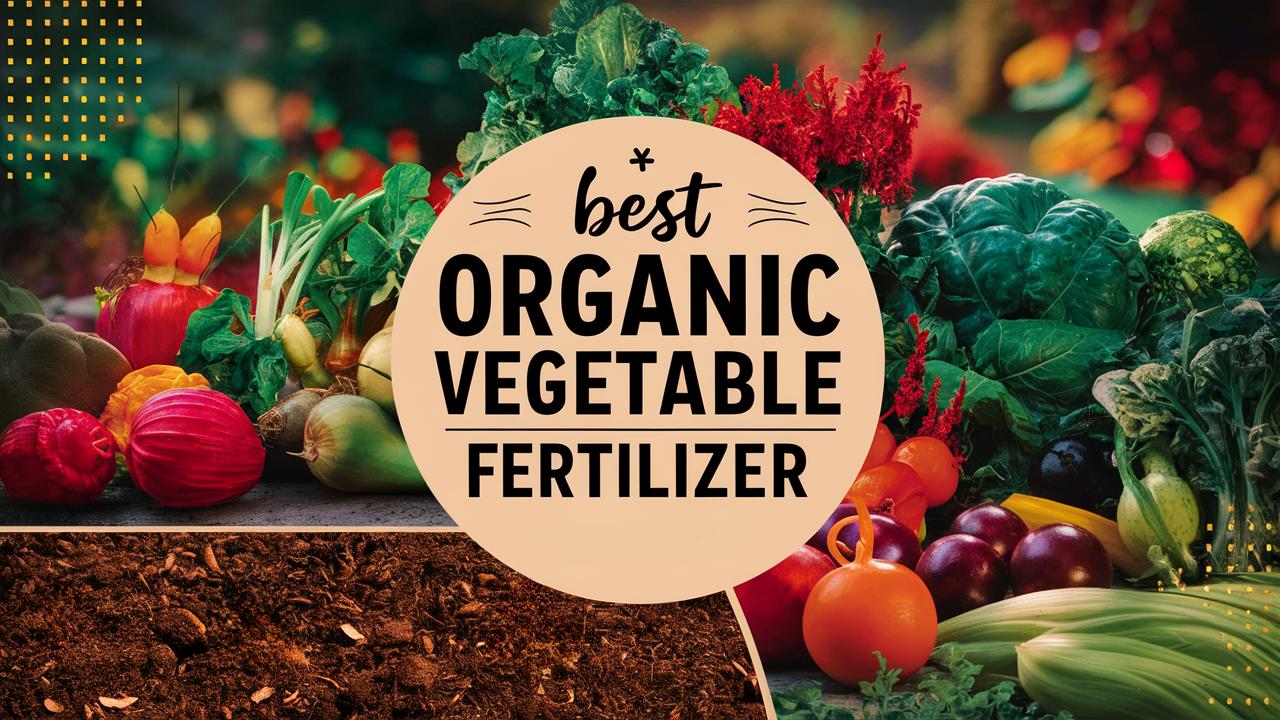In this guide, we will help you select the best organic vegetable fertilizer, ensuring that you have the knowledge and tools to enrich your soil and grow healthy, vibrant vegetables.
Best Organic Vegetable Fertilizer
| Image | Name | Rating | Shop |
|---|---|---|---|
 | Dr. Earth Organic Fertilizer |  | |
 | Organic Plant Magic |  | |
 | Organic Plant Fertilizer |  |
Dr. Earth Fertilizer
The Dr. Earth Home Grown Tomato, Vegetable & Herb Fertilizer is a top-notch choice for gardeners seeking an organic option. This 4lb fertilizer has earned the distinction of being the only Non-GMO Project Verified fertilizer in the U.S.A.
This product stands out for its safety features and commitment to transparency, as evident from the certifications it has received such as OMRI, OIM, CCOF, NOP, and Non-GMO Project Verified. Crafted with human and feed grade ingredients, it’s free from synthetic chemicals, GMO-infested chicken manure, and other toxic substances. With its nutrient-rich blend of multi-minerals, proteins, carbohydrates, humic acids, and trace elements, it helps grow the healthiest vegetables for your family.
Gro Thrive Powder
When it comes to fertilizer for organic vegetables, you’ll want a product that’s both effective and gentle on the environment. Our top recommendation is Organic Plant Magic – Truly Organic Fast-Acting Soluble Plant Food. This all-purpose fertilizer concentrate is designed to provide everything your plants need to grow strong and healthy.
This product stands out from others due to its ease of use and comprehensive nutrient profile. Simply add it directly to seed, soil, or water for the perfect solution. With the ability to treat up to 2,000 sq ft of soil or plants with just one pound of fertilizer, you can rest assured that your vegetables will be the healthiest they can be. Plus, Organic Plant Magic is packed with essential plant nutrients, trace minerals, and beneficial microorganisms that promote vibrant growth and intense flavor.
Organic Plant Fertilizer
This Down To Earth Organic Vegetable Garden Fertilizer is an excellent choice if you’re looking for a reliable and all-natural way to nourish your veggie garden. With its non-toxic formula, it’s safe for the environment and won’t harm beneficial insects or pets.
The slow-release formula ensures that nutrients are delivered gradually over time, reducing the risk of nutrient leaching. The balanced NPK ratio of 4-4-4 promotes healthy root, foliage, and fruit development in a wide range of vegetables. Plus, it’s easy to apply directly to the soil or mix into garden beds – no fuss required!
Jobe’s Organic Fertilizer
If you’re looking for a reliable and eco-friendly way to fertilize your vegetable garden, consider Jobe’s Organics Granular Garden Fertilizer. This product offers a straightforward solution for nourishing your tomatoes and vegetables with essential nutrients.
The fertilizer’s formula is specifically designed with an NPK ratio of 2-5-3 to provide the necessary boost for high-yielding plants with vibrant foliage. Plus, it’s entirely free from synthetic chemicals, making it OMRI listed for organic gardening by the USDA. Easy application and measurement ensure you won’t over-fertilize your crops, and the granular texture is made to minimize mess and wasteful runoff.
Burpee Organic All Purpose Granular Plant Food
When it comes to fertilizing your organic garden, you want a product that delivers long-lasting results without compromising the integrity of your soil. That’s why we recommend Burpee Organic Tomato & Vegetable Granular Plant Food. This easy-to-apply granule formula provides plants with essential nutrients immediately and continues to feed them for up to 3 months.
This plant food is perfect for gardeners looking for a reliable, OMRI-listed option that promotes superior results throughout the season. Since Burpee has been a trusted name in gardening for generations, you can count on this product to deliver as promised. With its hassle-free application and continuous feeding system, Burpee Organic Tomato & Vegetable Granular Plant Food is an excellent choice for organic gardeners seeking a high-quality fertilizer.
Old Farmer’s Almanac Organic Tomato & Vegetable Plant Food
The Old Farmer’s Almanac Organic Tomato & Vegetable Plant Food Fertilizer is an excellent choice for gardeners looking to nourish their organic produce. This fertilizer is specially designed for use with tomatoes, vegetables, and other edibles, making it a great all-around option.
While there may be no detailed description provided for this product, its name and reputation as being associated with The Old Farmer’s Almanac suggest that it would adhere to the publication’s commitment to sustainability and organic gardening practices. If you’re seeking an effective fertilizer for your organic garden without added synthetic chemicals, this product is worth considering.
Tomato-tone
The Espoma Organic Tomato-Tone 3-4-6 with 8% Calcium is a top-notch fertilizer option for gardeners looking to promote healthy growth and fruit production in their tomatoes and vegetables. With its unique blend of natural and organic ingredients, including calcium to prevent blossom end rot, this fertilizer helps produce plump, abundant tomatoes without unwanted foliage.
This fertilizer is perfect for use on all types of tomatoes, from heirloom to hybrid, as well as other vegetables. Its 3-4-6 formula makes it easy to apply, and its Bio-tone formula enhances its effectiveness without introducing any harsh chemicals into the soil. As a certified Organic Input Material, Tomato-Tone meets all requirements for organic production, making it a safe and responsible choice for gardeners committed to sustainable gardening practices.
Fox Farm Organic Vegetable Fertilizer
The Fox Farm Happy Frog Tomato and Vegetable Fertilizer is an excellent choice for promoting strong growth in vegetables like tomatoes. This dry tomato fertilizer provides a boost of essential nutrients that support plant resistance, root efficiency, and overall health.
This organic fertilizer features a 5-7-3 NPK ratio, making it perfect for supporting plants throughout every growing stage. The addition of mycorrhizal fungi boosts root strength by enhancing water and nutrient uptake, while the calcium content helps strengthen cell walls and increase resilience against diseases. Plus, it’s designed with organic gardening in mind, making it a great choice for eco-conscious gardeners looking to naturally nourish their plants.
Down to Earth All Purpose Mix
This all-purpose fertilizer from Down To Earth is a great choice for organic gardeners looking to promote healthy plant growth without burning their leaves. Its 4-6-2 formula provides a balanced mix of nitrogen, phosphorus, and potassium that’s suitable for vegetables, herbs, flowers, and container plants of all types.
One pound may not seem like much, but it packages a strong punch thanks to its blend of premium organic ingredients including fish bone meal, blood meal, feather meal, rock phosphate, langbeinite, greensand, humates, and kelp meal. These natural ingredients support microbial activity in the soil while adding essential nutrients that promote fertility and steady growth. Plus, Down To Earth’s All Purpose Mix is listed by the OMRI for use in organic production, so you can have peace of mind knowing that your plants (and garden) are being nourished sustainably.
How To Choose an Organic Vegetable Fertilizer
Gardening is a rewarding pastime, especially when it involves growing your own vegetables. Cultivating a thriving vegetable garden requires careful consideration of many factors, not least of which is the choice of fertilizer. As more gardeners transition to sustainable practices, organic vegetable fertilizers have gained popularity due to their natural ingredients and environmental safety.
Understanding Organic Fertilizers
Before diving into how to choose an organic vegetable fertilizer, it is essential to understand what organic fertilizers are and how they differ from conventional options. Organic fertilizers are derived from natural sources, including plant and animal materials. This broad category includes compost, manure, bone meal, blood meal, and seaweed extract. Unlike synthetic fertilizers, which often contain harsh chemicals, organic fertilizers feed the soil and promote a healthy ecosystem that supports plant growth.
Benefits of Organic Fertilizers
Nutrient-Rich: Organic fertilizers typically contain a balanced mix of macronutrients like nitrogen (N), phosphorus (P), and potassium (K), as well as essential micronutrients. The nutrients are released slowly, providing a steady supply to plants over time.
Soil Health: In addition to feeding plants, organic fertilizers improve soil structure and promote biodiversity in the soil biome. Healthy soil can support a host of beneficial organisms like earthworms and microbes.
Sustainability: By using organic fertilizers, gardeners contribute to sustainable gardening practices. Organic farming reduces pollution and enhances the environment, relying on natural processes to enhance soil fertility.
Safety: Organic fertilizers pose little to no risk of chemical runoff that can pollute waterways. They are generally safe for use around pets and children, making them a more eco-friendly choice.
Understanding these benefits sets the stage for making informed decisions regarding your fertilization strategy.
Identifying Your Soil Needs
One of the first steps to selecting an organic vegetable fertilizer is assessing your soil. Healthy soil should contain the right balance of nutrients and organic matter. Before you can determine which fertilizer to use, it’s crucial to conduct a soil test. This process can reveal the pH level and nutrient content of your soil, allowing you to identify any deficiencies that need to be addressed.
Conducting a Soil Test
Collecting Soil Samples: Take samples from various spots throughout your garden to get a representative mix. Use a clean trowel to dig down about 6 inches, placing the soil into a clean bucket.
Mix and Dry: Combine the soil from your different samples in the bucket and remove any debris. Allow the mixture to dry for a day or two to prepare for testing.
Send for Testing: You can either send your soil sample to a laboratory for detailed analysis or use a home soil test kit. Most labs will provide a comprehensive report detailing nutrient levels, pH, and recommendations tailored to your soil’s specific needs.
Understanding your soil composition will guide you in selecting the correct fertilizer that can address any deficiencies, ensuring optimal growth for your vegetables.
Choosing the Right Organic Fertilizer Types
Organic fertilizers come in a variety of forms and functions. Understanding the different types can help you make an informed decision. Here are some of the most common varieties:
1. Compost
Compost is a nutrient-rich organic material resulting from the decomposition of plant and animal matter. It is one of the most versatile fertilizers you can use:
Benefits: Compost improves soil structure, increases moisture retention, and provides a slow release of nutrients.
Usage: Spread a 2-3 inch layer of compost on your garden beds at the beginning of the growing season. It can also be mixed into the soil.
2. Manure
Animal manure from cows, chickens, or horses can offer a rich source of nutrients:
Benefits: Manure adds organic matter, provides essential nutrients, and enhances microbial activity in the soil.
Usage: Before using, let a composting process take place to kill pathogens and reduce the risk of burning plants. Aged manure can be applied in the spring or fall, worked into the soil for best results.
3. Bone Meal
Bone meal is made from finely ground animal bones, typically from cattle:
Benefits: It is an excellent source of phosphorus, which is vital for root development and flowering.
Usage: It should be applied to the soil at planting time to support robust root growth in your vegetables.
4. Blood Meal
Blood meal is a powerful organic nitrogen source derived from animal blood:
Benefits: It promotes lush foliage and is particularly beneficial for plants that require high nitrogen levels.
Usage: Apply sparingly, as too much nitrogen can cause excessive leaf growth at the detriment of fruit production.
5. Fish Emulsion
Fish emulsion is a liquid fertilizer made from fish remains, rich in nutrients:
Benefits: It provides a balanced nutrient profile (including nitrogen, phosphorus, and potassium) and is absorbed quickly by plants.
Usage: It’s best used as a foliar spray or diluted in water for soil application during the growing season.
6. Seaweed Extract
Seaweed extracts are derived from various types of seaweed:
Benefits: They contain trace minerals and growth hormones that enhance plant health and resilience against stress.
Usage: Usually available as a liquid concentrate, seaweed extract can be mixed with water and applied directly to plants or soil.
Choosing the right type of organic fertilizer ultimately relies on the specific needs of your soil and the vegetables you are growing. Consider conducting crop rotations to diversify nutrient uptake and make informed choices on fertilizers during different seasons.
Understanding N-P-K Ratios
When selecting an organic fertilizer, understanding the N-P-K ratio is key. This ratio represents the relative amounts of nitrogen (N), phosphorus (P), and potassium (K) in the fertilizer. Each of these nutrients plays a distinct role in plant development:
Nitrogen (N): Critical for leaf growth and overall plant vigor, nitrogen is necessary for protein synthesis and chlorophyll production.
Phosphorus (P): Vital for root development, flowering, and fruiting, phosphorus can aid in energy transfer within plants.
Potassium (K): Important for overall plant health, potassium helps in the regulation of water in plants, strengthens stalks, and enhances disease resistance.
To match fertilizers with crop needs, consider the growth stage of your vegetables. Young plants require a higher nitrogen content for leafy growth, while flowering or fruiting stages may need more phosphorus and potassium. Look for fertilizers that cater to the specific needs of your vegetable garden, ensuring your plants receive balanced nutrition throughout their growing cycle.
Sustainable Sourcing of Organic Fertilizers
As you choose an organic vegetable fertilizer, it’s important to consider the sourcing and production methods. Seek out products that prioritize sustainable practices, ensuring you are doing your part to protect the environment and promote ecological integrity.
Purchasing Local Vs. Commercial
Local Sourcing: Purchasing organic fertilizers from local producers or farmers markets can often mean fresher products that have lower carbon footprints due to reduced transportation needs. Many local businesses also provide additional information about their sourcing methods and the ingredients used in their fertilizers.
Commercial Brands: On the other hand, established commercial brands often have a wealth of resources and research backing their products. They might also offer specialist formulas tailored to specific plants or needs, and their reliability can bring peace of mind.
Regardless of where you buy your fertilizer, ensure that it is certified organic to help maintain the integrity of your gardening practices. Look for certifications from reputable organizations or labels indicating that the product adheres to organic standards.
Timing Your Fertilizer Application
Understanding when to apply your organic fertilizers can significantly affect their effectiveness. Fertilizer application timing should align with your plants’ growth stages and the seasons.
Pre-planting
Before planting seeds or transplants, it’s wise to amend your garden soil with compost or other organic fertilizers. Incorporate these amendments into the soil to allow organisms time to break them down and make nutrients accessible for new plants.
During Growth
Once your vegetables are established, additional applications may be necessary depending on their nutrient needs. This could involve side-dressing with dry organic fertilizers or using liquid fertilizers for a quick nutrient boost during critical growth phases.
Preparing for Fall
As the growing season winds down, consider performing one last amendment to your soil. Adding organic matter or fertilizers can enhance your soil for next year’s growing season. This practice contributes to nutrient buildup and improves soil health over time.
Adjusting for Specific Vegetable Needs
Different types of vegetables may have unique nutritional requirements. Understanding the specific needs of your crops allows you to tailor your fertilizer choices accordingly.
Leafy Greens
Vegetables like lettuce, spinach, and kale thrive on nitrogen-rich fertilizers. Applying blood meal or compost high in nitrogen before planting can result in healthy, vibrant greens.
Root Vegetables
Carrots, beets, and potatoes require well-balanced nutrition with a focus on phosphorus for root development. Bone meal added to planting holes or a balanced organic fertilizer can support robust root growth.
Fruiting Vegetables
Plants like tomatoes, peppers, and cucumbers benefit from higher potassium and phosphorus levels, which aid in flower and fruit development. A fertilizer with a higher middle number in the N-P-K ratio, such as bone meal or a balanced organic fertilizer, should be applied once flowering begins.
By adjusting your fertilizer choices based on the crop type, you can ensure that each plant gets the nutrients it needs to thrive throughout the growing season.
Conclusion
Choosing the right organic vegetable fertilizer is a fundamental aspect of creating a successful garden. With the proper understanding of your soil needs, types of organic fertilizers, nutrient ratios, and plant requirements, you can cultivate a thriving vegetable patch. Relying on organic fertilizers not only promotes better plant growth but also supports the health of the environment and your local ecosystem.











